The best self-fertile pear varieties: cultivation features
Fragrant and aromatic pears grow in most Russian gardens. The fruits are used for processing and sale, eaten fresh and dried for the winter. Winter preparations, desserts, lush baked goods are made from sweet pulp. To get a rich harvest, it is important to take into account a number of characteristics when choosing a variety: the color and size of the fruit, the density and sugar content of the pulp, the nuances of care and the ripening time. One of the important criteria is self-fertility. What are self-fertile pear varieties and what are their advantages, we will consider in the article.
The content of the article
Characteristics and description of self-pollinated pear varieties
Self-pollinated (self-fertile) pears grow separately; they do not need pollinating insects (wasps, bees) and other trees to ripen. The opposite of such varieties is self-fertile pears, which are pollinated by pollen from nearby growing garden plants.
Reference. Self-fertile varieties are unpretentious in planting and growing. They do not require special care, therefore, any amateur gardener can grow a rich harvest.
Such trees fit for growing in the middle zone of the country and in the northern regions, where, due to frequent winds and rains, pollen does not reach the flowers. Plants are planted in an array or one by one, depending on the size of the site.
Popular varieties of self-fertile pears
Experienced gardeners recommend buying self-fertile pear seedlings from trusted agronomists. Two-year-old specimens are suitable for planting in the climatic conditions of Russia. The seedlings should be light brown, resilient, free of mechanical defects and traces of damage from diseases and pests.
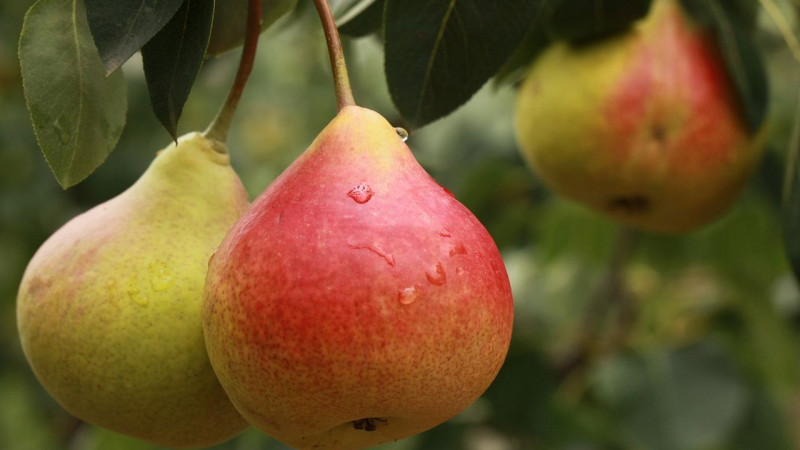
Memory Timofeev
Summer residents appreciate the Timofeev memory pear for frost resistance. The variety is grown in the cold regions of the country - in the Urals and in Siberia... Saplings quickly take root in the soil, adapt well to climatic conditions. Average height, compact crown - the tree does not take up much space, suitable for planting in small areas. Fruits are green-yellow, with a pinkish side, the shape is classic pear-shaped. The pulp is creamy, fine-grained, the taste is juicy and harmonious, the skin is of medium thickness. The harvest ripens at the same time. Pears are used to prepare juices, compotes, preserves, and jams. Good Memory Timofeev and fresh.
This variety grows best on loamy soils. For the culture, a light area is chosen, old foliage and debris are removed, a hole is dug out and fertilized with a mixture of cow dung, peat and humus. In the first few days, the pear is watered abundantly with warm water. After a week, the soil is moistened once every 2-3 weeks.
Tenderness
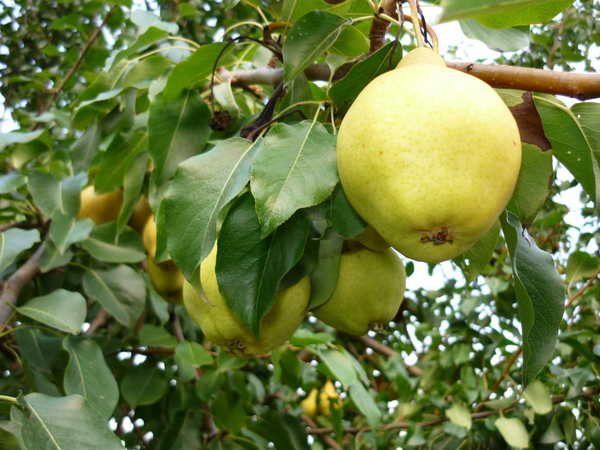
The trees are vigorous, reaching a height of 6 m, the crown is columnar. The branches are sparse, the leaves are dark green glossy. The fruits ripen 4 years after planting, the shape is pear-ovate. Weight - from 150 to 200 g. The color is yellow-green, with a pinkish blush. The peel is of medium density, there is a slight waxy coating on the surface. Ripening begins in the second decade of August and lasts until mid-September. The pulp is creamy, tender and juicy, the taste is sweet and sour and aromatic. Tenderness can withstand temperatures as low as -40 ° C, therefore it is suitable for planting in the coldest regions of the country. During the season, the tree gives up to 30 kg of harvest.
Reference. Summer and autumn pears are indispensable for making desserts and drinks. They are used to make pies, crumbles, warm salads, muffins, jams and even condensed milk.
The fruits do not deteriorate within a month after being removed from the tree, and retain their attractive presentation.The variety is grown in small garden plots and large agricultural farms. The tree prefers loose and breathable soils, sunny and slightly elevated areas. Moderate humidity is important for Tenderness - an excess of water causes rotting of the root system.
In memory of Yakovlev
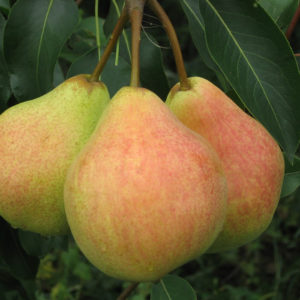
The variety is recommended for planting in the Central, Volgo-Vyatka, Middle Volga regions. The ripening period is early autumn, winter hardiness is increased. The tree is undersized, with a dense and compact crown, the leaves are dark green. The main shoots grow parallel to the ground. The fruits are slightly ribbed, the average weight is 125 g. The skin is light yellow, with a slight blush, the stalk is long and straight. The pulp is semi-oily, creamy, sweet, with a slight sourness and strong aroma. Pears are suitable for processing and preparation of compote, preserves, marmalades, they tolerate transportation well.
Despite the self-fertility, to increase the yield, summer residents planted other pear varieties nearby: Banquet, Lada, Tenderness. This growing method stimulates flowering and fruit set. The distance between plants should be at least 3-4 m - planting too close provokes the development of diseases.
Noticeable
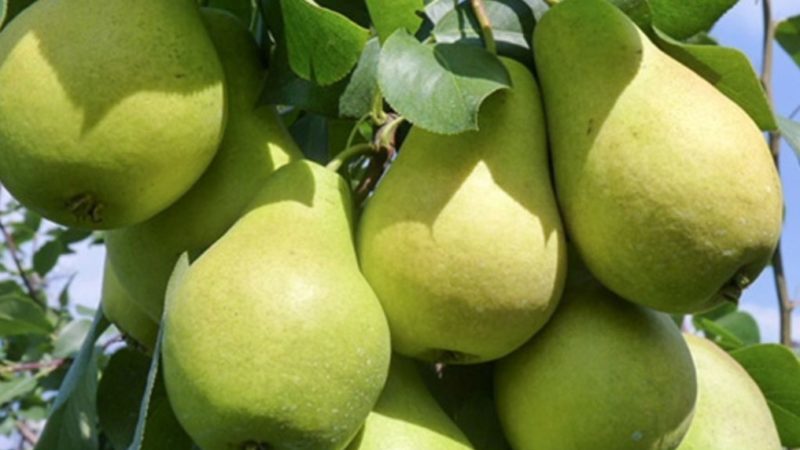
The noticeable one got its name thanks to its large fruits: the weight of the pear is about 180 g, it is difficult to miss it in the garden. The color is yellow-green, the shape is short-pear-shaped, the peel is dense, with a small dark point. The pulp is white juicy, the taste is dessert, not sour. Tasting score - 4.6 points. Ripening period is late autumn, Noticeable is used for sale, transportation, storage.
The trees are tall and powerful, so it is advisable to think about the planting site in advance. During the season, the plant gives from 30 to 40 kg of yield, depending on climatic conditions and compliance with agrotechnical rules. Recommended growing regions are the Urals and the middle strip of the country. Pear Noticeable does not need pollinators.
Attention! For long-term storage, pears are removed from the trees unripe so that they mature later. A box with air holes is used, paper is laid on the bottom and walls. The fruits are laid out with the stalk up so that they do not come into contact with each other. The box is placed in a disinfected cellar or basement.
Visibly resistant to scab and downy mildew, rarely damaged by insects. Suitable for planting in the Leningrad region. However, it is important not to forget about preventive measures: spray trees with Bordeaux mixture (after flowering - 1% solution, up to - 3%), treat with "Merpan" preparation.
Grand Champion
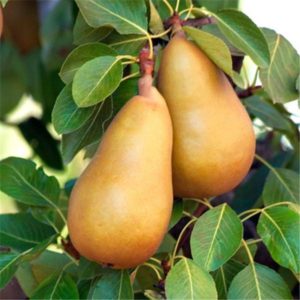
A variety of American selection, ripening period in autumn, the harvest is harvested in late September or early October. Trees of medium vigor, compact pyramidal crown, medium density. Fruits are large, the weight of one reaches 220 g. The shape is elongated pear-shaped, the surface is slightly ribbed. The color is golden orange, with small brown spots all over the fruit. The pulp is oily, very tender and juicy, sweet and sour, aromatic. Tasting score - 4.8 points. The variety is fast-growing, begins to bear fruit in 3 years after planting. Pears do not fall, they are universal in use. The Grand Champion is resistant to powdery mildew, rust, scab.
Attention! Do you need a Champion pear pollinator? No, but the presence of a number of other varieties will increase the yield by 15–20%.
To accelerate the ripening of fruits, gardeners recommend foliar dressing 3-4 times per season. In autumn, prepare a mixture of 30 g of superphosphate and 15 g of potassium chloride, add 150 ml of wood ash. In the spring, add 50 g of nitroammofoska (30 liters of the mixture is enough for 1 m²). Foliar dressing strengthens the plant's immunity and protects against diseases.
Banquet
The ripening period is late, the harvest is harvested from mid-October to the end of autumn. Leave the Banquet in Moscow suburbs... The trees are of medium height, the crown is very dense. The leaves are large, green, slightly dissected, the branches grow upward.Pears are roundish, yellow-green, with a slight blush, weight - about 250 g. The peel is dense, so the fruits are used for transportation and storage. The pear is kept in the refrigerator until the end of January. The pulp is beige, semi-oily and juicy. The taste is sweet and sour.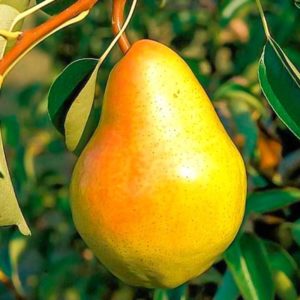
Fruiting occurs 3 or 4 years after planting, the high-yielding variety - the tree gives up to 40 kg of fruit annually. The purpose of the variety is universal: juices and compotes, jam and preserves are cooked from pears, marmalade, marshmallows, marshmallows, jelly are prepared.
In cultivation, Banquetnaya does not require special skills and knowledge, but due to its dense crown it needs regular formation. Annual seedlings are cut to a height of 80 cm, leaving only those buds that are required for the growth of young shoots. In mature trees, attention is paid to crown thinning, cutting diseased and dry shoots, and shortening overgrown branches.
Conclusion
Pollination of pears requires insects or nearby varieties. In order not to worry about this, summer residents choose self-pollinated varieties for growing. On the plots, the Grand Champion, in Memory of Yakovlev, Banquet, Noticeable are grown. They are unpretentious in care and planting, bear fruit well in any regions of Russia, and are frost-resistant. Most pears are suitable for storage in the basement or refrigerator, suitable for fresh consumption, processing, drying, conservation. The soft and tender pulp of the fruit is used for cooking compotes and preserves.